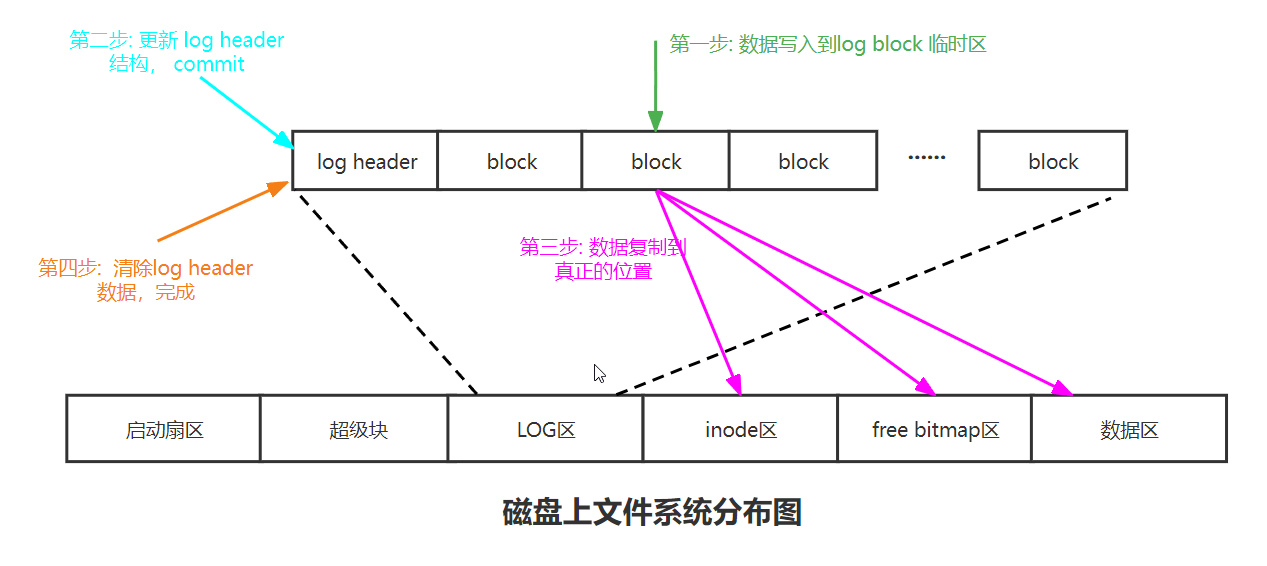xv6——文件系统:磁盘的LOG日志机制
目录
目录
作者:殷某人
更新时间:2022/07/03
WAL机制
xv6操作系统中的log机制, 目的是为了在系统 cash的时候,可以达到:
- 数据的一致性,达到事务的原子性目的: 要么写入全部成功,要么写入全部失败
- 提供发生故障时,数据恢复机制。
本质原理就是遵守 Wirte Ahead Log原则 , 即系统首先将所有写操作以及写的内容记录在log中,然后写入到文件的实际位置。

xv6的log机制原理图

数据结构
磁盘上的log header
log header, 位于磁盘LOG区的第一个BLOCK块上, 它里面记录了当前保存在LOG区的block块的数目以及block块的索引值。
struct logheader {
int n;
int block[LOGSIZE];
};
内存中的log结构体
它的功能为: 在存中储存上log区的属性信息和磁盘log header的缓存映射, 以及操作过程中的控制信息。
struct log {
struct spinlock lock;
int start; // log信息在磁盘上的位置(开始的block块的索引号)
int size; // log区的总的block块的数目。
int outstanding; // 当前正在使用LOG机制的文件系统调用数目(目的是别超过了LOG系统总容量)
int committing; // 当前是不是正处于LOG的提交中,也就是正在写LOG进入磁盘呢
int dev;
struct logheader lh; // 磁盘logheader在内存中的一份映射
};
函数实现
初始化log系统 initlog
- 读磁盘上的超级块,载入log区的信息,包含大小、起始block、logheader信息
- 如果存在log缓存,说明发生过crash,进行数据恢复。
void
initlog(int dev)
{
if (sizeof(struct logheader) >= BSIZE)
panic("initlog: too big logheader");
struct superblock sb;
initlock(&log.lock, "log");
readsb(dev, &sb);
log.start = sb.logstart;
log.size = sb.nlog;
log.dev = dev;
recover_from_log();
}
读写log header
static void
read_head(void)
{
struct buf *buf = bread(log.dev, log.start);
struct logheader *lh = (struct logheader *) (buf->data);
int i;
log.lh.n = lh->n;
for (i = 0; i < log.lh.n; i++) {
log.lh.block[i] = lh->block[i];
}
brelse(buf);
}
static void
write_head(void)
{
struct buf *buf = bread(log.dev, log.start);
struct logheader *hb = (struct logheader *) (buf->data);
int i;
hb->n = log.lh.n;
for (i = 0; i < log.lh.n; i++) {
hb->block[i] = log.lh.block[i];
}
bwrite(buf);
brelse(buf);
}
数据从log区转换到实际位置区 install_trans(void)
- xv6系统中,把一次log的commit称作transcation , 即事务,所以函数名为:
install trans. - 读log头,获取需要转换的log总数目以及目的block块,进行数据转移。
static void
install_trans(void)
{
int tail;
for (tail = 0; tail < log.lh.n; tail++) {
struct buf *lbuf = bread(log.dev, log.start+tail+1); // read log block
struct buf *dbuf = bread(log.dev, log.lh.block[tail]); // read dst
memmove(dbuf->data, lbuf->data, BSIZE); // copy block to dst
bwrite(dbuf); // write dst to disk
brelse(lbuf);
brelse(dbuf);
}
}
数据恢复处理函数recover_from_log()
static void
recover_from_log(void)
{
read_head();
install_trans();
log.lh.n = 0;
write_head();
}
把数据从内存的cache区写入到磁盘的log区
- log区的第一个block块保存的是logheader数据, 所以从第二个block块开始保存数据。
static void
write_log(void)
{
int tail;
for (tail = 0; tail < log.lh.n; tail++) {
struct buf *to = bread(log.dev, log.start+tail+1); // log block
struct buf *from = bread(log.dev, log.lh.block[tail]); // cache block
memmove(to->data, from->data, BSIZE);
bwrite(to); // write the log
brelse(from);
brelse(to);
}
}
log由内存写入到磁盘的事务级处理void commit()
这个过程是事务级处理,要么全部写入磁盘成功,要么全部写入失败。它的操作步骤为:
- 首先把数据输入到log暂存区
- 刷新log header信息
- 把数据从log暂存区转移到数据真正的位置上
- 重置log header信息
static void
commit()
{
if (log.lh.n > 0) {
write_log(); // Write modified blocks from cache to log
write_head(); // Write header to disk -- the real commit
install_trans(); // Now install writes to home locations
log.lh.n = 0;
write_head(); // Erase the transaction from the log
}
}
使用文件系统调用前, 执行begin_op()
- 判断当前log是否在commit过程中,如果是,睡眠等待。
- 判断当前的log剩余空间是否不足, 如果是,睡眠等待。
- 都满足条件, 增加计数。
void
begin_op(void)
{
acquire(&log.lock);
while(1){
if(log.committing){
sleep(&log, &log.lock);
} else if(log.lh.n + (log.outstanding+1)*MAXOPBLOCKS > LOGSIZE){
// this op might exhaust log space; wait for commit.
sleep(&log, &log.lock);
} else {
log.outstanding += 1;
release(&log.lock);
break;
}
}
}
带log机制的写buffer操作——对外提供的写操作的接口
当在内存中修改了一个磁盘数据后,如果想从缓存真正写入的磁盘上, 有bwirte()函数。但是,xv6支持了log机制,使用log_write()代替了bwrite()函数来完成这个工作。 该函数其实只完成了两个事:
- 在logheader中记录要写入的block块
- 标记记录的buffer为dirty状态,即表示待写入磁盘上
真正的正磁盘的动作在end_op()函数中来完成。
void
log_write(struct buf *b)
{
int i;
if (log.lh.n >= LOGSIZE || log.lh.n >= log.size - 1)
panic("too big a transaction");
if (log.outstanding < 1)
panic("log_write outside of trans");
acquire(&log.lock);
for (i = 0; i < log.lh.n; i++) {
if (log.lh.block[i] == b->blockno) // log absorbtion
break;
}
log.lh.block[i] = b->blockno;
if (i == log.lh.n)
log.lh.n++;
b->flags |= B_DIRTY; // prevent eviction
release(&log.lock);
}
使用文件系统调用后,执行end_op()
它真正的执行写磁盘的操作, 即对应函数体中的commit动作。
void
end_op(void)
{
int do_commit = 0;
acquire(&log.lock);
log.outstanding -= 1;
if(log.committing)
panic("log.committing");
if(log.outstanding == 0){
do_commit = 1;
log.committing = 1;
} else {
// begin_op() may be waiting for log space,
// and decrementing log.outstanding has decreased
// the amount of reserved space.
wakeup(&log);
}
release(&log.lock);
if(do_commit){
// call commit w/o holding locks, since not allowed
// to sleep with locks.
commit();
acquire(&log.lock);
log.committing = 0;
wakeup(&log);
release(&log.lock);
}
}






【推荐】国内首个AI IDE,深度理解中文开发场景,立即下载体验Trae
【推荐】编程新体验,更懂你的AI,立即体验豆包MarsCode编程助手
【推荐】抖音旗下AI助手豆包,你的智能百科全书,全免费不限次数
【推荐】轻量又高性能的 SSH 工具 IShell:AI 加持,快人一步
· 10年+ .NET Coder 心语 ── 封装的思维:从隐藏、稳定开始理解其本质意义
· 地球OL攻略 —— 某应届生求职总结
· 提示词工程——AI应用必不可少的技术
· Open-Sora 2.0 重磅开源!
· 周边上新:园子的第一款马克杯温暖上架